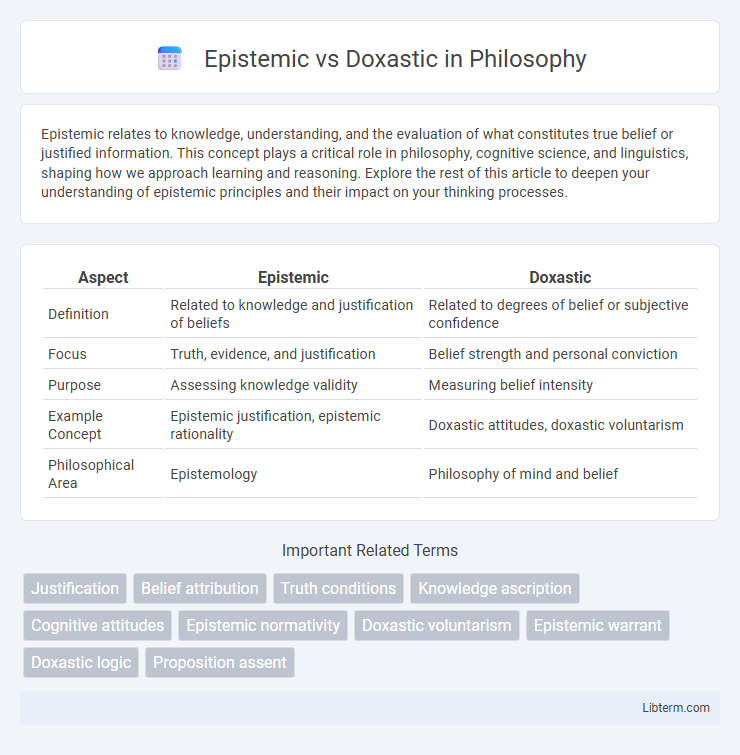Epistemic relates to knowledge, understanding, and the evaluation of what constitutes true belief or justified information. This concept plays a critical role in philosophy, cognitive science, and linguistics, shaping how we approach learning and reasoning. Explore the rest of this article to deepen your understanding of epistemic principles and their impact on your thinking processes.
Table of Comparison
| Aspect | Epistemic | Doxastic |
|---|---|---|
| Definition | Related to knowledge and justification of beliefs | Related to degrees of belief or subjective confidence |
| Focus | Truth, evidence, and justification | Belief strength and personal conviction |
| Purpose | Assessing knowledge validity | Measuring belief intensity |
| Example Concept | Epistemic justification, epistemic rationality | Doxastic attitudes, doxastic voluntarism |
| Philosophical Area | Epistemology | Philosophy of mind and belief |
Introduction to Epistemic and Doxastic Concepts
Epistemic concepts pertain to knowledge, belief justification, and truth, focusing on what it means to know something and how beliefs can be validated. Doxastic concepts, by contrast, center specifically on the nature and structure of belief, exploring how individuals form, hold, and revise their beliefs. Understanding the distinction between epistemic justification and doxastic attitude is crucial for analyzing philosophical questions about knowledge, belief, and rationality.
Defining Epistemic: Relating to Knowledge
Epistemic pertains to knowledge, encompassing the nature, scope, and justification of what is known or believed. It involves analyzing how information is acquired, validated, and structured within cognitive systems. Epistemic considerations are crucial in distinguishing between what is true knowledge and mere belief or opinion.
Understanding Doxastic: Pertaining to Belief
Doxastic relates specifically to belief systems and the mental attitudes individuals hold toward propositions, distinguishing it from epistemic concepts centered on knowledge and justification. Understanding doxastic states involves analyzing how beliefs influence reasoning processes and decision-making without requiring truth or evidence for validation. This focus on subjective belief highlights the importance of doxastic logic in modeling agents' attitudes within philosophy and cognitive science.
Key Differences between Epistemic and Doxastic
Epistemic pertains to knowledge and justified belief, emphasizing the truth and evidence supporting a claim, while doxastic relates to mere belief or opinion without requiring justification. Key differences include epistemic states demanding rational support and truth conditions, whereas doxastic states involve subjective acceptance regardless of evidence. Understanding these distinctions is crucial in epistemology for analyzing belief formation and knowledge claims.
Epistemic Justification vs Doxastic Justification
Epistemic justification pertains to the rational support a belief has based on evidence or reasons directly related to truth-seeking, emphasizing the cognitive processes that make a belief epistemically responsible. Doxastic justification, on the other hand, concerns the justification for holding a belief in a psychological or practical sense, often focusing on the believer's internal perspective or the justification for the belief's acceptance. The distinction highlights how epistemic justification is truth-oriented and evaluative, while doxastic justification is centered on the rationality of the belief's acceptance within the believer's epistemic framework.
The Role of Evidence in Epistemic and Doxastic States
Epistemic states are fundamentally shaped by evidence that justifies beliefs, ensuring their truth-tracking nature and rational grounding. Doxastic states, on the other hand, represent simply held beliefs or attitudes that may or may not be supported by evidence, reflecting an individual's subjective commitment. The distinction hinges on how evidence functions as a normative standard for epistemic justification versus a contingent factor in doxastic acceptance.
Philosophical Theories on Knowledge and Belief
Epistemic concepts pertain to knowledge and justification, emphasizing the relationship between belief and truth within philosophical theories, particularly epistemology. Doxastic refers to beliefs themselves, focusing on the mental states and attitudes individuals hold regarding propositions, central to doxastic logic and the study of belief systems. Differentiating epistemic from doxastic frameworks aids in understanding how knowledge claims are justified versus how beliefs are formed and maintained in philosophical discourse.
Epistemic and Doxastic in Contemporary Epistemology
Epistemic concepts in contemporary epistemology primarily refer to the justification and knowledge-related states, focusing on what it means to know or to be justified in belief. Doxastic attitudes involve beliefs and other mental states regarding acceptance of propositions, emphasizing the psychological aspect of holding beliefs regardless of their epistemic justification. The distinction between epistemic and doxastic highlights the difference between normative questions about knowledge and justification, and descriptive questions about belief formation and mental states.
Practical Applications: Everyday Epistemic and Doxastic Distinctions
Epistemic considerations guide beliefs formed through evidence and justification, essential in scientific research and legal reasoning to ensure reliability and truth. Doxastic attitudes reflect personal beliefs or opinions, influencing everyday decisions such as choosing a career or evaluating news sources based on trustworthiness. Recognizing the distinction helps individuals critically assess information versus subjective viewpoints, improving decision-making processes across education, politics, and interpersonal communication.
Summary: Why Epistemic vs Doxastic Matters
Understanding the distinction between epistemic and doxastic concepts is crucial for clarifying the nature of knowledge and belief. Epistemic states relate to justification and evidence supporting a proposition, while doxastic states concern the subjective acceptance or belief without necessarily having justification. This differentiation impacts fields such as epistemology, cognitive science, and artificial intelligence by improving how knowledge representation and reasoning are modeled.
Epistemic Infographic

 libterm.com
libterm.com